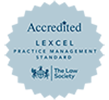As a result of the Late Payment of Commercial Debts Act 1998, as amended, you can now claim ALL your costs for the issue of the county court proceedings. This means at claim stage it possible to re-coup all your costs and fees on a successful recovery with Thomas Higgins Limited.
Under the Late Payment of Commercial Debts (Interest) Act 1998, as amended, you are entitled to claim back the costs involved with recovering your debts.
Therefore, by choosing Thomas Higgins for your debt recovery, there is no need for you to be out of pocket for chasing money that is rightfully yours. With a successful claim, not only are our costs covered but as we don't charge commission or a percentage, you will receive all of what is retrieved from the debtor and at no extra cost. Please refer to our costs and fees table, which provides detail of what you can recover at each stage.
But that’s not all.
By sending one of our Late Payment Demands to your debtor you are also able to claim compensation and additional interest on each of your outstanding invoices. You are entitled to claim between £40 to £100 in compensation per invoice and interest at 8% above the Bank of England's base rate. This is all in addition to the original debt amount and legal costs.
What is debt collection or recovery?
Debt collection is the process of pursuing payments of debts owed by individuals or businesses. Thomas Higgins specialises in legal debts owed by businesses to other businesses.
An organisation that specializes in debt collection is known as a collection agency. Most collection agencies operate as agents of creditors and collect debts for a fee or percentage of the total amount owed.
Thomas Higgins is a specialist debt recovery & collection law firm.
We can progress your claim through the courts in the quickest possible time, ensuring our costs are kept to a minimum.
Learn more about debt collection actions in this video:
What is the process of legal debt collection?
The process of collecting commercial debts is typically done in four stages: Pre-Issue Letter, Claim Form, County Court Judgment, and thereafter Enforcement.
- Pre-Issue Letter: Before issuing any legal proceedings, a letter before action should be sent to a debtor
- Claim Form: If you send a Pre-Issue Letter to your debtor but do not receive a satisfactory response then the next stage is to issue legal proceedings through the County Court. You will send the debtor a claim form requiring them to pay the debt, plus interest and costs compensation, if applicable within 14 days.
- County Court Judgment: Also referred to as a CCJ. This is a court order that confirms the debtor has defaulted on their payment. A CCJ can be obtained immediately after the expiry date of the Claim. The CCJ gives you the power to take enforcement action to collect the debt.
- Enforcement: Once a CCJ has been obtained, it is then possible in most cases to “enforce” immediately. Enforcement of a judgment order under £600.00 can be enforced using a Warrant of Control, this is issued to the County Court Bailiff. A judgment order more than £600.00 can be enforced using a Writ of Control, this can then be issued to a Hight Court Enforcement Officer. We find this is the most appropriate method of enforcement based on over 40 years experience and expertise in similar cases.
What is the Late Payment of Commercial Debts (Interest) Act 1998?
The Late Payment of Commercial Debts (Interest) Act 1998, as amended, has two purposes for debt recovery.
First, the Act seeks to compensate creditors for the late payment of debts. Secondly, the Act is also used to deter late payment. The Act extends to businesses and public sector organisations in England, Scotland and Northern Ireland.
In summary, for invoices that are not paid on time, the Act enables you to claim interest, compensation and your reasonable costs of collecting the debt where these exceed the compensation.




